ASX makes it six in a row as business bounces and Link soars
Stocks fade back to flat, as survey reveals business rebound, Link shares jump and Woodside CEO plans to retire.
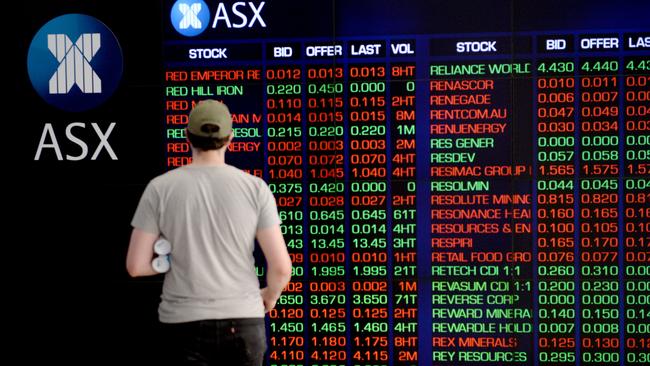
- Woodside’s CEO to retire
- Oil Search ‘rallied too hard’
- G8 apologises for underpaying staff
- Universal buys Bob Dylan catalogue
Welcome to the Trading Day blog for Tuesday, December 8. Australian stocks were flat in afternoon trade but still managed to post a gain for the sixth day in a row after, after Wall Street wavered on worries about coronavirus infection levels. The Dow lost 0.5 per cent, the S&P 500 dropped 0.2 per cent and the Nasdaq rose 0.5 per cent. Locally, AFR columnist Joe Aston’s defamation hearing continues. NAB’s business survey revealed bounce in confidence.
4.50pm: Six in a row for ASX
Australia’s sharemarket bucked offshore falls to be up six days in a row.
The S&P/ASX 200 closed up 0.2pc at 6687.7 after trading between 6658.9 and 6699.4.
Its resilience to offshore falls was impressive considering that Asian markets also fell on Tuesday and US futures pointed to additional falls on Wall Street.
One major point of difference is that COVID cases and restrictions in Australia are virtually non-existent, but not yet under control in Europe, the US and parts of Asia.
But while banks rose, with CBA up 1.3pc, Australian market gains were mostly in defensive growth and quality stocks, with Consumer Staples, Tech, Health Care outperforming along with Financials.
Value stocks in the Energy, Real Estate, Consumer Discretionary, Industrials, Materials and Financials sectors mostly underperformed the index
Takeover activity in Australia is increasingly a driving force with SS&C’s $5.65/share bid for Link Administration worth more than $3bn, pushing its share price up 14pc to $5.65.
Late in the day Aussie Super launched a NZ$7.43/share bid for dual-listed NZ infrastructure investment company, Infratil, worth more than $5bn.
Business confidence surged to a 31-month high and business conditions hit a 20-month high in November according to NAB’s monthly business survey.
Bridget Carter 4.13pm: Aussie Super launches NZ$5.37bn Intratil bid
Australian Super has launched a NZ$5.37 billion takeover bid to buy New Zealand-based infrastructure investment company Infratil.
The company has hired Goldman Sachs as its defence adviser after receiving a NZ$7.43 per share approach, say sources. Australian Super is working with Morgan Stanley.
The company’s shares last traded at $6.80, with its market value at $4.06bn.
Infratil, also listed in Australia, has paused trading ahead of an announcement on the offer.
The company is a major investor in Australian infrastructure and owns airports, electricity generators, retailers and telecommunication networks, with operations also in New Zealand and the United States. The company is managed by Morrison & Co.
Among Infratil’s assets is a 50.76 per cent in Trustpower, a 60 per cent interest in renewable energy business Tilt Renewables and Longroad Energy Partners.
It owns Vodafone New Zealand and recently acquired an interest in the Australian healthcare business Qscan from private equity firm Quadrant in a deal valuing the business at $730m.
The company also owns an interest in the Canberra Data Centres business.
It comes as the company’s share price has recently rallied at a time that renewable energy, healthcare and data centre assets remain in high demand amid a low interest rate environment.
The deal will likely see Infratil cut ties with its current manager Morrison, which could create cost saving benefits for Australian Super.
No doubt one area of focus will be whether the deal gains government support from an Overseas Investment Office perspective, given that it is one of New Zealand’s largest infrastructure owners.
Bridget Carter 4.04pm: AusSuper takes $NZ5.4bn tilt at Infratil
DataRoom | | Australian Super has put forward a $NZ5.37 billion takeover bid to buy New Zealand-based infrastructure investment company Infratil.
The company has hired Goldman Sachs as its defence adviser after receiving a NZ$7.43 per share approach, say sources.
The company’s shares last traded at $6.80, with its market value at $4.06bn.
Infratil, which is also listed in Australia, has paused trading ahead of an announcement on the offer.
More to come.
Ben Wilmot 3.32pm: EG snaps up Bunnings
Real estate fund manager EG has snapped up a Bunnings in the Sydney suburb of Rockdale for $48.75m as it builds up a key fund that has $800m worth of firepower.
The site is in a tightly held precinct south of Sydney Airport and will benefit from infrastructure upgrades including the M6 Motorway. The asset is currently fully leased to Bunnings on a passing yield of 5.4 per cent.
“This acquisition is underpinned by a strong covenant in Bunnings. The property has a flexible zoning which offers multiple exit strategies in the future,” EG senior manager of capital transactions, Will Clark, said.
The property is the fourth addition to the EG ACE fund which was launched in June 2019 with an initial equity commitment of $500m.
“The fund currently has the potential to acquire a further $800m in assets, which will continue to grow over time. The strategy is to acquire well located industrial, office and retail assets across Australia with the potential to add value through active asset management,” EG fund manager Michael Noblet said.
3.15pm: Woodside may eye Santos chief, says CS
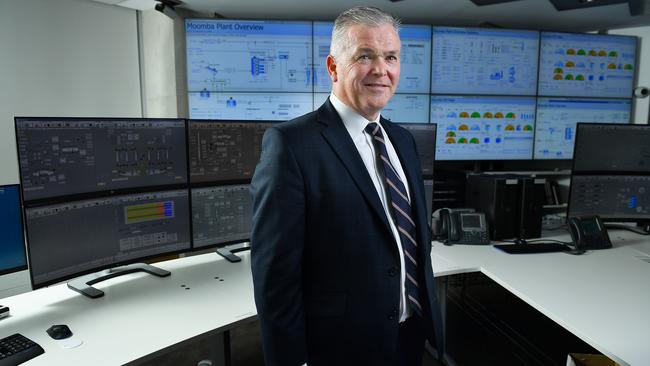
Santos chief executive Kevin Gallagher may be a potential successor to Woodside Petroleum boss Peter Coleman, while the leadership shake-up could further delay its $16bn Scarborough gas project in Western Australia, Credit Suisse said.
Mr Gallagher - a contender for the Woodside job when Mr Coleman was appointed in 2011 - may prove a popular choice and could be a risk for Santos’s fortunes in the interim.
“We see Santos CEO Kevin Gallagher as a potential choice given popularity with equity investors and familiarity with Woodside business - Gallagher used to run Woodside’s North West Shelf asset and was a contender for the top job before Peter Coleman joined as CEO in 2011,” Credit Suisse analyst Saul Kavonic said.
“We see the possibility that Kevin Gallagher moves to Woodside as a potential risk Santos may face in 2021 as it could cause Santos to lose the ‘Kevin premium’ we believe it achieves due to market trust in his management.”
Woodside made a decision in March to defer development of Scarborough due to the oil rout with a final investment decision now set for the second half of 2021.
However, Mr Coleman’s exit could see that timeline slip further.
“Any new CEO, especially if external, may wish to take a pause and review the situation, potentially causing delay,” Mr Kavonic said. “The succession announcement may also indicate some of the Woodside board have a more cautious approach to Scarborough final investment decision in the wake of Covid.”
Potential internal successors to Mr Coleman for the Woodside CEO role include chief financial officer Sherry Duhe, executive VP development and marketing Meg O’Neill and chief technology officer Shaun Gregory.
Ms O’Neill is the frontrunner, according to the broker.
“From an equity markets perspective she could be viewed favourably as a strong technical pick - operations and projects background - to maintain base business resilience.”
Patrick Commins 3.05pm: ACCC recommendation threatens big bank profits: CS
The competition watchdog’s recommendation that lenders be forced to directly contact existing home loan customers to let them know they could get a better deal could in a “worst case scenario” hit big four banks’ profits by $1.8bn, Credit Suisse analysts reckon.
The ACCC on Friday released its home loan price inquiry final report, which found that there’s a big difference between what existing borrowers were paying for their mortgages versus what was available in the market today. For example, across the major banks, the report showed that borrowers with a loan over 10 years old were on average paying 50-60 basis points more than one approved now.
One of the four recommendations was that banks should be forced to contact their customers directly to tell them, essentially, that they were being shafted.
Credit Suisse’s analysts crunched the numbers on what would happen to major banks’ bottom lines were all loans over three years old repriced to the current average rate on offer. The results were not pretty: a $2.5bn hit to revenues and a $1.8bn hammer blow to profits in the 2022 financial year.
“However we caution taking this (worst case) view as we expect the proportion that action this will be less than 100 per cent particularly in the 3‐ to 5‐year cohort and less so in the 5‐ to 10‐year cohort,” the analysts write. “That said the risk is that a major bank takes the lead on this issue and automatically makes the change and in effect reprices the industry.”
Westpac would be the hardest hit (a 9 per cent drop in profits, or $553m in FY22), followed by CBA (-7 per cent and a $533m hit), while ANZ and NAB profits in FY22 could drop by as much as 6 per cent, or around $340m.
2.48pm: ASX back to flat
Australian stocks were flat in early afternoon trade, losing steam after a lunchtime surge that followed the release of NAB’s monthly business survey.
Shortly before 3pm (AEDT) the S&P/ASX 200 was dead flat, at 6674 points.
Perry Williams 1.50pm: An ambition unfulfilled
Peter Coleman has been at the helm of Woodside Petroleum for a decade but he leaves with unfinished business.
After an absolutely torrid year for the global oil and gas industry — marked by a crash in crude prices, writedowns and massive job cuts — the decision by the 60-year-old to leave Australia’s biggest energy producer would not have come easily.
Coleman took over from the brash Don Voelte in 2011 and was typecast as the calm after the storm.
Born in Sale, Victoria, the low-key Coleman had spent over a quarter century at ExxonMobil and one of his first jobs was announcing a budget blowout for Woodside’s Pluto LNG project — built by Voelte — along with a production delay.
Voelte had also picked fights with Western Australia’s other big producer, US giant Chevron, who is a partner in the North West Shelf LNG plant and, at the time, the long-delayed Browse project.
Coleman smoothed out those tensions and eventually set his focus on the Burrup Hub plan, with the latest iteration involving gas from the remote Scarborough field being piped to an expanded Pluto plant and gas from Browse being processed through the existing NW Shelf plant which it operates.
Progress has been made but a COVID-sparked oil crash delayed both Scarborough and Browse, meaning Coleman will leave Woodside without fulfilling one of his big ambitions.
Perry Williams 1.18pm: Coleman rejects Rio speculation
Retiring Woodside Petroleum boss Peter Coleman has rejected speculation linking him with the top job at mining giant Rio Tinto.
“No. I’ve heard that speculation before but no, no, no,” Mr Coleman told The Australian on Tuesday when asked if he was in the frame for the Rio role.
Mr Coleman will leave Woodside by the second half of 2021 after a decade in charge, while Rio is close to announcing the successor to outgoing CEO Jean-Sébastien Jacques.
Mr Jacques agreed to step down from Rio’s top job on September 11 over the Juukan Gorge scandal, along with iron ore boss Chris Salisbury and corporate affairs chief Simone Niven.
He is due to leave Rio when a successor is found, with the company having put a deadline on its search for a new chief executive of March 31, 2021.
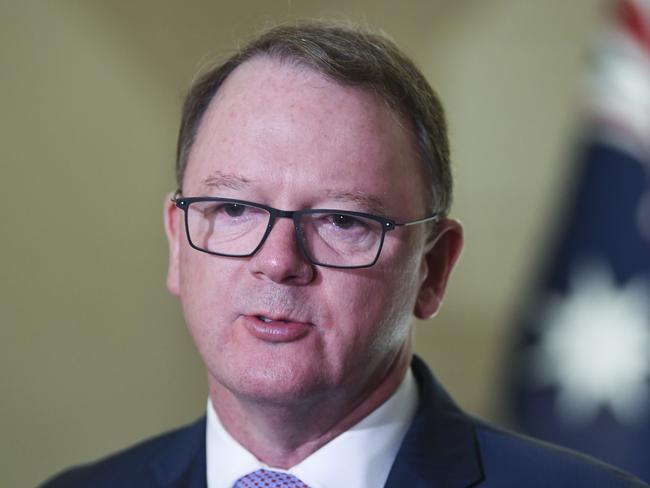
Newcrest Mining boss Sandeep Biswas ruled himself out of the running for the top job at Rio with other names still believed to still be in contention including Anglo American finance boss Stephen Pearce, former Fortescue chief executive Nev Power and former BP chief financial officer Brian Gilvary.
Potential internal successors to Mr Coleman for the Woodside CEO role include chief financial officer Sherry Duhe, executive VP development and marketing Meg O’Neill and chief technology officer Shaun Gregory.
Joyce Moullakis 1.13pm: Not guilty pleas in cartel case
ANZ, Citigroup, Deutsche Bank and six current and former executives have separately lodged not guilty pleas in a landmark criminal cartel case, which commits them to stand trial in the Federal Court.
Magistrate Jennifer Atkinson heard the pleas in Sydney’s Downing Centre on Tuesday, and said the matters would next be heard in the Federal Court on December 15.
The matter relates to an ANZ capital raising five years ago and how the banks managed a shortfall of shares not taken up by investors. The Australian Competition and Consumer Commission lobbed the explosive criminal case in 2018, and fellow bank on the capital raising JPMorgan was granted immunity for its co-operation.
The defendants attended the hearing over the phone on Tuesday, given COVID-19 court procedures, although each bank and individual acknowledged their not guilty pleas to charges levelled at them.
The cartel action involves Citigroup’s former Australia boss Stephen Roberts, Citi bankers John McLean and Itay Tuchman and ANZ executive Rick Moscati.
Deutsche Bank’s former country head Michael Ormaechea and former equity capital markets boss Michael Richardson are also part of the action.
Representing ANZ, Tim Game, QC, noted the bank was pleading not guilty to four charges but wanted to make a statement to the court on Tuesday regarding the process.
“We have complied with our obligation... we appreciate it is inevitable that we will be committed to the Federal Court,” he said, as he highlighted procedural issues including that the bank had received material late, with the latest tranches of documents arriving in October and November.
“These proceedings have miscarried and are continuing to miscarry.”
ANZ would not make an application to the court on the matter, according to Mr Game, because due to governing legislation it was “likely to be fruitless”.
The other parties to the case put it on the record that they agreed with ANZ’s grievances.
12.58pm: High Court won’t hear ACCC Pacific National appeal
The High Court has dismissed the ACCC’s application for special leave to appeal the Full Federal Court’s decision that Pacific National’s acquisition of the Acacia Ridge terminal from Aurizon would not be likely to substantially lessen competition.
The dismissal means the the decision of the Full Federal Court stands, and Pacific National can proceed with its acquisition of the Acacia Ridge Terminal.
“The ACCC sought special leave to appeal to the High Court because we considered that this case raised important issues about the application of Australia’s merger laws,” ACCC Chair Rod Sims said.
“This case also involved important markets. We considered that Pacific National’s acquisition of the Acacia Ridge terminal would likely have a significant impact on competition in intermodel rail, with flow-on effects for consumers and the wider economy.”
Mr Sims said the watchdog faces challenges in contested merger cases.
“These challenges raise important issues for the consideration of whether Australia’s current merger laws are fit for purpose.”
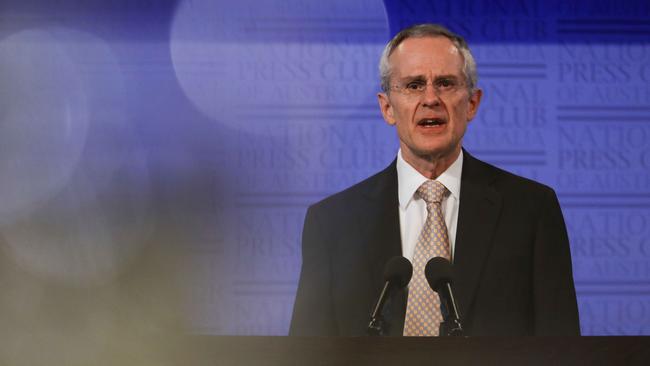
David Swan 11.54am: Apple fails to have Epic case thrown out
Tech giant Apple has asked that an Australian case brought against it by Fortnite maker Epic be thrown out by the Federal Court, arguing that the legal tussle should be limited to California.
Epic Games is taking on Apple in the Federal Court over its 30 per cent app store fee, and alleging Apple has breached both Australian Consumer Law and the Competition and Consumer Act.
In a case described by Epic founder and CEO Tim Sweeney as the most significant of this decade, Epic says Apple has an absolute monopoly over its mobile app store, and that Apple’s 30 per cent cut of in-app purchases is exorbitant. Apple has defended the fees as being in line with other retailers.
At a case management hearing on Tuesday Apple asked for a stay of proceedings, given the two companies are embroiled in a similar battle in California.
Epic’s counsel argued there has been significant “competitive harm” to Australian iOS users so it‘s appropriate the action be brought before an Australian court.
The court declined to throw out the case, setting a provisional hearing date for March 2021, before the California case, slated for May, will have started.
Justice Nye Perram also flagged that he has an iPhone, though neither sides said that would be an issue.
“It’ll come as no great surprise to you, I have an iPhone and I have an Apple Pay account. I don’t think that creates any difficulties.”
11.45am: ASX turns up as after early fall
Australia’s sharemarket was higher in late morning trading after erasing an opening fall.
The S&P/ASX 200 rose 0.3pc to 6692.5 after initially falling 0.2pc to 6658.9.
The index rose to the morning’s high after NAB’s monthly business survey showed confidence hit a 31-month high and conditions were the best in 21 months in November.
The rise came despite overnight falls in Wall Street and a 0.3pc fall in S&P 500 futures in APAC trading.
Gains also broadened with nine of 12 market sectors in the green after a bifurcated start to the day.
Tech was strongest with Link Administration up 14pc at $5.66 after disclosing a $5.65/share bid from SS&C.
But Health Care, Consumer Staples, Industrials and Utilities were also outperforming.
The Energy, Real Estate and Consumer Discretionary sectors remained down but were well off their lows.
Melissa Yeo 11.32am: Youfoodz slips after ASX debut
Ready made meal maker Youfoodz has made a shaky debut on the local market, slipping by 20 per cent.
The group, based in Brisbane, raised $70 in its IPO to fund its growth initiatives, including the fit-out of a new purpose-built manufacturing facility and the repayment of a shareholder loan.
Shares were last trading at $1.19, and as low as $1.15, compared to its offer price of $1.50.
Youfoodz is forecasting FY2021 net revenue of $149.9m.
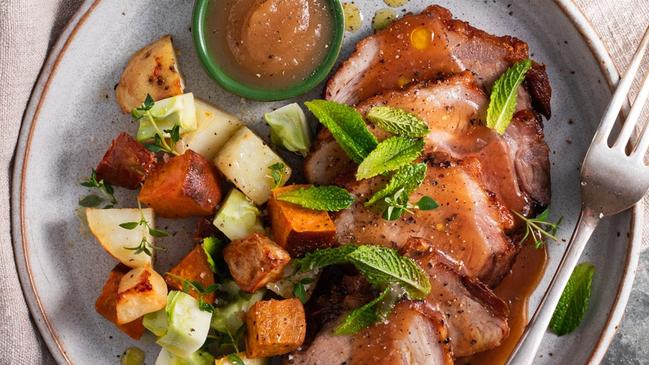
11.30am: Business roars back: NAB survey
Business confidence rose to a 31-month high and conditions hit a 20-month high, according to NAB’s monthly business survey.
Confidence rose to 9 points to 12 points - the highest since April 2018 and conditions rose 7 points to 9 points - the highest since March 2019.
Amid unprecedented fiscal and monetary support as well as coronavirus vaccines, business confidence is fast approaching the March 2019 peak of 14.7 points which was the highest since 2010.
The survey continues to suggest a rapid rebound in the economy as restrictions are eased and state borders open up, according to NAB.
While renewed optimism in Victoria drove the improvement in confidence, Victoria was one of only two states to report a deterioration in conditions, although we expect conditions to improve as the impact of its recent severe lockdown wears off,” says NAB chief economist, Alan Oster.
“Overall both confidence and conditions are now above average, and stronger than the period right before the pandemic – albeit this partly reflects some ‘snapback’ following the containment of the virus.”
Encouragingly, other lead indicators improved in the month, with a large rise in capacity utilisation and forward orders turning positive, the latter suggesting that the pipeline of work has begun to build, Mr Oster added.
“That said, there is some way to go before a full recovery is reached,” he cautioned. “Capacity utilisation remains around 1.4ppt below its long-run average, while the capex and employment indexes remain in negative territory.
“Even with the significant improvement in trading conditions and profitability, businesses will likely need to see a sustained improvement in forward orders and a complete recovery in capacity utilisation before renewed hiring and investment plans are put in place.”
11.08am: Link shares surge after offer
Shares in share registry operator Link Group surged 13.5 per cent after late Monday receiving a conditional, non-binding proposal from US financial services computer software provider SS&C Technologies Holdings Inc.
The SS&C proposal of $5.65 a shares trumps the Carlyle, PEP bid of $5.40 a share.
The new bid values the company at $3.02bn, which suggests the likelihood of a successful takeover bid for Link has increased.
The Link Group board said it would consider the SS&C proposal, including obtaining advice from its financial and legal advisers.
Link, which has an investor presentation on Wednesday at 11am (AEDT), traded at $5.65, up 69 cents.
Bridget Carter 10.56am: Link set to open data room to bidder
SS&C Technology Holdings is expected to be ushered into the data room of Link Administration Holdings in the coming days after making a rival $3 billion-plus bid for the business this week.
The $5.65 per share approach trumped the earlier $5.40 per share offer for Link from Pacific Equity Partners and The Carlyle Group.
Those funds are currently conducting due diligence on the Australian listed company for a potential acquisition.
This was despite their initial $5.40 per share offer being rebuffed by Link.
The share trading activity in Link in Tuesday morning trade indicated that the market is betting an even higher offer is coming for the company, say market analysts.
Shares were around $5.61, and analysts say they would typically be trading at a lower price if the market believed that the $5.65 per share offer was the best and final offer that would emerge.
It is understood that SS&C emerged as the result of the efforts of Link’s defence advisers, Macquarie Capital and UBS, scanning the market to see if there were other parties that may be interested in pursuing the target.
10.57am: Woodside CEO Coleman to retire
Woodside says CEO Peter Coleman intends to retire in the second half of 2021, after more than 10 years in the role.
The company has begun an internal and external search for the company’s next CEO.
Mr Coleman said it was the right time to retire and transition leadership, with the company well-positioned for the future.
“In this challenging year, Woodside has taken the prudent decisions needed to maintain safe and reliable operations and protect our growth plans, while setting up our company for the next phase.
“I am extremely proud of how our Woodside team has managed the uncertainty and is on track to deliver record production and exceptional safety performance,” he said.
“Retiring in 2021 ensures continuity to support the Scarborough investment decision, which will transform Woodside, while ensuring our international projects in Senegal and Myanmar maintain their positive momentum.”
Chairman Richard Goyder said Mr Coleman has been an “outstanding CEO”.
“His commitment to prudent capital management and maintaining a strong balance sheet and liquidity has complemented his track-record for operational excellence.”
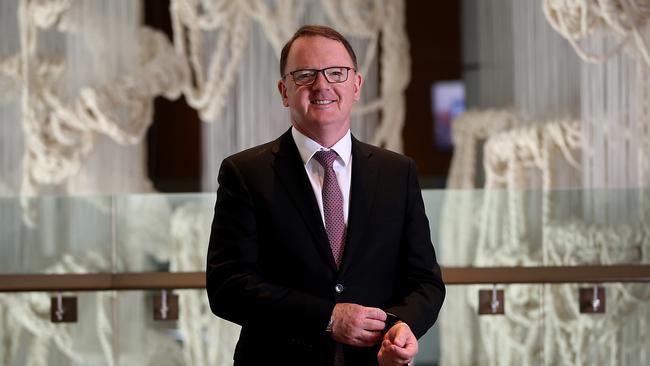
Will Glasgow 10.37am: Beijing extends beef ban
China has broadened its attack on Australia’s $2.7b beef export trade, suspending a sixth supplier as the Morrison government was poised to pass foreign relations legislation that has angered Beijing.
China’s General Administration of Customs late on Monday said it had suspended imports from Meramist, a Queensland-based abattoir.
The latest beef ban was announced in a brief notice on China’s Customs website.
No reason for the ban was given, inviting speculation it was linked to the Morrison government’s expected passage this week of its Foreign Relations Bill.
China in late August banned the family-owned meat predecessor John Dee, a day after Prime Minister Scott Morrison unveiled the proposed law, which would allow it to rescind Victoria’s Belt and Road agreement.
Four other Australian beef exporters were banned in May.
In 2019, Australia exported more than $600m of beef to China, just under a quarter of the $2.7b sold overseas, according to the industry’s peak body Meat & Livestock Australia.
The latest beef ban comes less than a fortnight after China’s Ministry of Commerce imposed an up to 212 per cent tariff on Australian wine, crippling the export industry.
David Swan 10.29am: Amazon picks Melbourne for new hub
US tech giant Amazon has chosen Melbourne for a new AWS cloud infrastructure region, an investment it says will likely contribute billions of dollars to the Victorian tech economy in the next 10 years as the state moves to recover from the devastating coronavirus pandemic.
The company’s Melbourne data centre will open in the second half of 2022 and create 90 jobs in the immediate future, joining its existing Sydney region – launched in 2012 – and eight regions in total across Asia Pacific.
Amazon says it has invested $3 billion into Australia over the past decade, a number that is set to skyrocket as businesses across the country complete digital transformations and shift their workloads the cloud.
Terms of any arrangement with the Victorian government to bring AWS to Victoria were not disclosed.
Minister for Economic Development Tim Pallas said the investment was proof the state was “not sitting back” when it comes to bouncing back from COVID-19.
10.27am: ASX dips slightly in mixed trade
Australia’s sharemarket dipped slightly in mixed trading, in line with the overnight performance of Wall Street.
The S&P/ASX 200 fell 0.2pc to 6658.9 in opening trade but recovered to be flat at 6675.
Value stocks mostly weakened, with the Energy, Consumer Discretionary, Real Estate, Financials and Materials sectors in the red.
Iron ore miners dipped with BHP down 0.7pc despite a fresh seven-year high in the spot price, though gold miners rose with Evolution up 2.4pc on higher gold prices.
But growth and quality stocks mostly rose with Tech, Health Care, Industrials, Consumer Staples and Utilities in the green.
Link Administration soared 13pc to $5.62 a share after receiving a takeover proposal from SS&C worth $5.65 a share.
Mackenzie Scott 10.15am: Redcape extends pub empire
Pub landlords Redcape Hotel Group have sealed the purchase of two Brisbane pubs for $27.5m.
The acquisition of the Shafston Hotel at Kangaroo Point and the Aspley Hotel in suburban Aspley from an offshore hospitality company will increase the group’s holdings in the state to eight.
The purchase will be paid for existing funds within the group and settled before June 2021.
Last month, Redcape purchased the Gladstone Hotel in Sydney’s inner west. It currently has 35 properties across NSW and Queensland.
Ben Wilmot 10.11am: Abacus raising $402 for property buys
Abacus Property Group has launched a $402m equity raising, with the group pouring the proceeds into buying office buildings and stuff storage facilities.
The company has gone on a $926m spree in the sectors and has recently put $155m
into self-storage and $50m into office acquisitions.
Abacus said it had identified another $160m worth of assets of which $130m was in advanced stages.
The company recently took full ownership of the Storage King platform.
Macquarie Capital is undertaking a 1 for 4.8 accelerated non renounceable pro rata entitlement offer to raise the $402m.
This will slash gearing to 17.5 per cent and give it firepower to buy about $911m of assets after the offer is completed.
Ben Wilmot 9.56am: APN trust buys retail properties
The APN Convenience Retail REIT has bought three service stations and is in exclusive due diligence on a further nine assets across SA, NSW, Queensland and WA, in a $75.3m deal.
The properties, which fit with the trust’s focus on daily shopping, are being picked up on a 6.1 per cent initial yield, and carry long leases to high quality tenants, with a weighted average lease expiry of 16.4 years.
The acquisitions are being funded by a fully underwritten institutional placement to raise about $30m at an issue price of $3.55 per security.
9.54am: Oil Search rallied too hard: Macquarie
Oil Search shares have rallied too hard and are now overvalued as they imply a Brent crude oil price of $US60, according to Macquarie Equities.
The broker cuts Oil Search to Underperform and Carnarvon Petroleum to Neutral, even as it lifts its 2021 average crude oil price forecast by 3.1pc to $US50 a barrel, although its 2022 forecast falls 4.9pc to $US53.75.
Strong early vaccine results have provided improved visibility to an eventual normalization in demand despite challenged near-term fundamentals amid surging winter COVID cases in the US and Europe as well as tensions within OPEC+. But Macquarie’s list of energy sector buys has gotten shorter following a strong rally in the sector.
It prefers Woodside, Beach, Karoon and Senex.
9.40am: ASX to end winning streak
Australia’s sharemarket is set to end a five-day winning streak after Wall Street slipped.
Overnight futures relative to fair value suggest the S&P/ASX 200 will open down 0.3pc at 6655.
That follows a 0.2pc fall in the S&P 500 amid record US COVID-19 cases and stay-at-home orders in California.
The local market may be vulnerable to a short-term pullback after a minor false break above the November peak at 6713.3 on Monday.
Last week’s low at 6511.4 looks like an important short-term support level and the potential trigger for a minor double-top pattern.
WTI crude oil fell 1.4pc, making Energy by far the worst sector in the S&P 500.
Crude fell as Iran said it’s preparing to raise exports, a sign that it expects a Joe Biden presidency to ease sanctions.
But spot iron ore rose 1.5pc to a fresh 7-year high of $US147.55 a tonne and spot gold rose 1.3pc to $US1862.73.
The US Financials sector also underperformed as US 10-year bond yields fell 4bps to 0.923pc.
Focus turns to NAB’s monthly business survey for November at 1130am.
Eli Greenblat 9.36am: Adairs forecasts ‘outstanding’ first half
Home furnishings retailer Adairs, in a trading update for the first half, says elevated sales continue to drive earnings even as the country comes out of lockdowns, with many of its stores closed.
And once again it was its online store that shot out the lights in terms of sales growth, mirroring strong digital sales for much of the retail sector through COVID-19.
The Adairs online store registered near 100 per cent sales gains for the first 23 weeks of fiscal 2021.
These buoyant trading conditions have given the retailer the confidence to forecast an almost tripling of its December half earnings to as much as $66 million with sales for the 26 weeks to December 27 almost doubling to as high as $245m for the period.
“With a few weeks to go, it is now clear our first half 2021 result will be outstanding and builds on the excellent result in 2020,” said Adairs chief executive Mark Ronan.
In its update, Adairs said for the first half of 2021 it was forecasting group sales of $235m to $245m, against $179m in 2020, with underlying earnings to be $62m to $66m against $23.2m in 2020. The December half of 2021 will also include a full six months of trading for its acquired online business Mocka against only five weeks of trading for the 2020 result.
Adairs said with three weeks remaining in the first half of 2021, sales have continued to remain elevated across all channels and are well ahead of the same period last year. This is despite 43 stores in the Melbourne Metropolitan area being closed for around 12 weeks of this period as a result of COVID-19 Government restrictions.
Unaudited sales for the first 23 weeks of fiscal 2021 were up 5.2 per cent at Adairs stores, up 17.3 per cent in like for like sales and up 99.7 per cent online.
9.30am: Uber offloads self-driving car unit
Uber Technologies has sold its self-driving car unit to a Silicon Valley competitor, Aurora Innovation, in the latest business exit by the ride-hailing company as it aims to deliver on a promise to shareholders to become profitable.
The two companies said that as part of the deal for the self-driving car unit, known as Advanced Technologies Group, or ATG, Uber will make a $US400 million cash investment in Aurora. Uber said it would hold a roughly 26 per cent stake in Aurora on completion of the deal. Uber CEO Dara Khosrowshahi also is joining the company’s board of directors.
Mr Khosrowshahi has moved to restructure Uber to deliver on a promise to make the company profitable, scaling back noncore businesses, including winding down its product incubator and artificial-intelligence lab. Uber has promised to be profitable on an adjusted basis before interest, taxes, depreciation and amortization by the end of next year.
Aurora is led by autonomous-driving pioneer Chris Urmson, who helped launch Google’s autonomous-driving project. The acquisition bolsters Aurora’s position in an industry that has suffered under numerous technical setbacks.

Dow Jones
Bridget Carter 9.17am: APN REIT halts ahead of raising
APN Convenience Retail REIT has entered a trading halt ahead of an equity raising to fund the acquisition of 12 petrol stations.
The company plans to secure $30m at $3.55 per share.
E&P Advisory and Moelis are underwriting the raise.
Shares last traded at $3.65.
9.12am: Hitch for Ovato raising
Beleaguered magazine printer and distributor Ovato will rejig its $40m capital raising after the ASX pulled the company up over concerns it may have contradicted listing rules, before ultimately granting the company a waiver to the operation of those rules.
The company said as a condition of the waiver shares have been suspended until December 29, with a revised investor presentation for the offer to be released later today.
The share raising, launched last Tuesday, involved raising the money through the issuance of 10.93 new fully paid ordinary shares at five cents a piece for each share currently on issue.
$25m of the raise has been conditionally underwritten by the Hannan family, which owns 53.6 per cent of the company, while a further $10m will be underwritten by Are media - a magazine publisher formerly known as Bauer, and a major customer of Ovato.
Following the raising the Hannan family will have an increased interest of 61.8 per cent while Are media will acquire a 22.9 per cent interest.
Additionally, the company said a creditors and members’ meeting approved the creditors’ scheme of arrangement on December 7
“The vote is the next key milestone on the path towards implementation of the restructure and recapitalisation of the business, involving a capital injection of up to $40 million, 300 redundancies and the closure of the Ovato printing plant at Clayton in Melbourne,” CEO Kevin Slaven said.
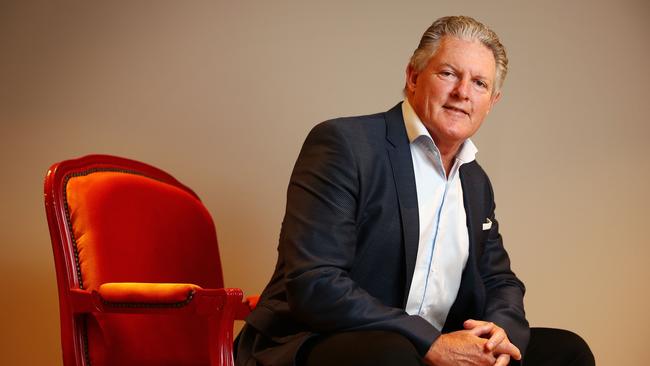
9.07am: What’s impressing analysts?
Carnarvon Petroleum cut to Neutral: Macquarie
MMA Offshore raised to Buy: Canaccord
Metcash cut to Neutral: Evans & Partners
Metcash cut to Neutral: UBS
OceanaGold raised to Neutral: Macquarie
Oil Search cut to Underperform: Macquarie
Tyro Payments raised to Neutral: Macquarie
8.48am: Tesla only 6th company to top $US600bn in value
Tesla cracked $US600 billion in value as shares continued on their epic 2020 run. The stock rose 7.1 per cent to $US641.76 a share.
Tesla is only the sixth company to reach that milestone in US markets, according to Dow Jones Market Data. The others are Amazon.com, Facebook, Apple, Google parent Alphabet and Microsoft.
Even more impressive are the recent gains. Tesla has added about $US220 billion in market capitalisation since the S&P index committee announced on November 16 that Tesla stock would be added to the S&P 500 index on December 21.
That is more than Toyota Motor is worth. Toyota is the second-most valuable auto maker on the planet, with a market capitalization of about $US215 billion.
Tesla stock is up about 57 per cent since November 16. Shares are now up about 660pc year to date, crushing comparable returns of the S&P and Dow Jones Industrial Average.

Dow Jones
8.43am: Elanor announces buyback
The Elanor Retail Property Fund has announced an on-market buyback of up to 10 per cent of its securities on issue, funded by its recent sale of the Auburn Central shopping centre in NSW for $129.5m.
The buyback will commence on December 22 and run for 12 months. The listed fund last traded at $1.12 per share.
8.39am: SunRice buys KJ&Co for $50m
SunRice Group has acquired branded food importer KJ&Co brands for $50m through its subsidiary Riviana Foods.
SunRice Group CEO Rob Gordon told the ASX in a statement that the acquisition would be share price accretive and compliment existing brands in the Riviana Foods business while increasing its scale.
Last year KJ&Co generated gross revenues of $59m. SunRice said the transaction would be funded from existing cash reserves and debt facilities.
8.36am: Bank of Queensland confirms guidance
Bank of Queensland has reaffirmed guidance for the 2021 financial year, with income and expense growth expected to be roughly neutral by the year’s end.
A total of 2500 housing loans worth $889m remain in COVID-19 deferral, representing 3 per cent of the bank’s mortgage portfolio, while 3,300 small to medium enterprise loans remain in deferral with a value of $390m - also representing about 3 per cent of the SME loan portfolio
This compares to a June 2020 peak of 14.5 per cent of the home loan portfolio and 22 per cent of the SME loan portfolio.
8.30am: G8 apologises for underpaying staff
G8 Education has identified instances of employee underpayment and reported the matter to the Fair Work Ombudsman in a move that is expected to cost $50m - $80m in remediation payments.
The company, which is currently facing a class action from investors led by Slater and Gordon, said the underpayments were identified during a review of award and legislative requirements and affect approximately 27,000 current and former staff stretching back to July 1, 2014.
The remediation costs, net of tax, are estimated to be between $35m and $65m and will be funded from existing cash reserves.
G8 CEO Gary Carroll said every staff member will be paid what they are owed and systems will be overhauled to prevent underpayments from occurring again.
“The group deeply regrets that these pay errors have occurred,” he said.
“We apologise unreservedly to any affected team member.
“As soon as we identified and quantified this issue, we initiated a remediation program to ensure they will be paid every dollar they are owed. The commitment of our people – particularly during the enormous challenges of the past year – is the key to our success.
“We are determined to ensure this issue can never be repeated.”
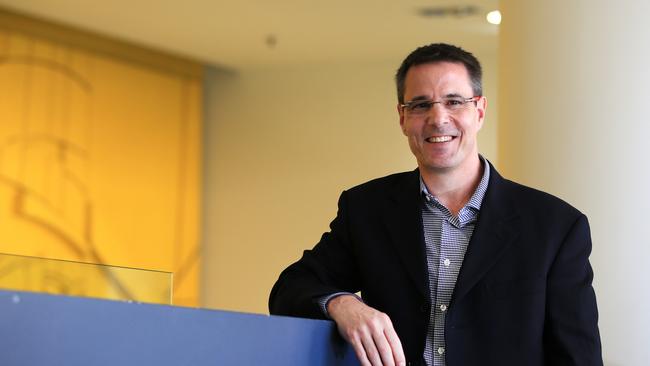
8.20am: Dow ends lower as Covid cases rise
The Dow Jones Industrial Average slipped, after hitting a record last week, as investors worried that elevated COVID-19 infection levels could weigh on economic growth through the winter months.
The blue-chip index ended lower by 0.5 per cent. The S&P 500 dropped 0.2 per cent, while the technology-heavy Nasdaq Composite ticked up 0.5 per cent to a new record high.
Stocks have rallied to records in recent weeks on brightening economic prospects due to the development of COVID-19 vaccines. But rising coronavirus infection levels and their potential impact on the rebound is weighing on sentiment. New restrictions intended to slow the spread of the virus in California went into effect Sunday night, after the number of people hospitalized in the US because of COVID-19 hit another record.
“For U.S. growth, the vaccine is not going to have a substantial impact on this third wave,” said James McCormick, a strategist at NatWest Markets. “The US growth picture in the very near term is clearly tilting lower.”
Data released Friday showed that US job growth slowed sharply in November, suggesting the labor-market recovery is losing steam amid the surge in coronavirus cases and new business restrictions.
“The V-shaped recovery has kind of flatlined,” said Scott Clemons, chief investment strategist at Brown Brothers Harriman. Still, stock investors have kept the market near records due to expectations that the U.S. economy will normalize after distribution of a coronavirus vaccine, he added.
In the near term, the rising case levels and faltering recovery could encourage Congress to pass a new fiscal-stimulus package, some investors said. An expanding, bipartisan group of lawmakers has been trying to settle on a coronavirus-relief agreement to help businesses and families through March. Lawmakers and aides said Sunday that they hoped to have legislative text ready early this week.
“It will focus the minds of Congress and help push things forward,” said Altaf Kassam, head of investment strategy for State Street Global Advisors in Europe. “The market feels like there is enough to worry about that a fiscal stimulus could get enacted.”
Overseas, the pan-continental Stoxx Europe 600 declined 0.3 per cent as trade talks between the European Union and the U.K. entered a crucial stage. The British pound fell 0.8 per cent against the dollar following reports suggesting that Brexit negotiations have broken down.
Dow Jones Newswires
Angelica Snowden 7.33am: Cruise ban extended
Royal Caribbean Cruises has again suspended Australian sailings until at least March, the largest cruise ship company in Australia has announced.
The ban was due to expire on December 17 after ships were stopped from docking in Australia from March 27 in the wake of the Ruby Princess debacle.
But Royal Caribbean Cruises announced global sailings would be suspended until February 28 next year and trips in Australian waters, due to restart from January 1, 2021, would be suspended until April 30, 2021.
The move comes after the federal government recently extended its ban on cruise ships in Australian waters from September 17 to December 17.
Important update on sailings through February 28, 2021.  🔗 https://t.co/t9930nMmcH pic.twitter.com/B5jzik4LG0
— Royal Caribbean (@RoyalCaribbean) December 2, 2020
7.15am: ASX to slip at open as Wall Street wavers
Australian stocks are poised for a slightly weaker start as the market pulls back from its iron ore rally.
Wall Street’s main indexes edged lower but the Nasdaq hit a new record high.
Shortly after 7am (AEDT) the SPI futures index was down 14 points, or 0.2 per cent.
Yesterday the ASX faded from a strong start but still closed up 0.6 per cent.
The Australian dollar was higher at US74.39c.
Iron ore was 1.5 per cent higher at $US147.55 a tonne, gold rose 1.4 per cent to $US1866 an ounce and Brent oil fell 0.9 per cent to $US48.79 a barrel.
7.09am: JPMorgan Chase urges more stimulus
JPMorgan Chase is urging the incoming Biden administration to support additional aid to people left jobless by the COVID-19 pandemic as a way to address income inequality, a banking source said.
In a list of recommendations to the President-elect’s team, the giant US bank said the coronavirus pandemic was “straining... families’ economic mobility and restricting the US economy,” citing in particular the August expiration of extra $US600 weekly payments from the government to the unemployed.
Recipients of that aid cut spending by 14 per cent after their expiration that month, and the decline shows no sign of “having plateaued, suggesting that spending among the unemployed could likely decline further,” the bank said.
“While the unemployed roughly doubled their liquid savings over the four-month period between March and July 2020, they spent two thirds of accumulated savings in August alone.”
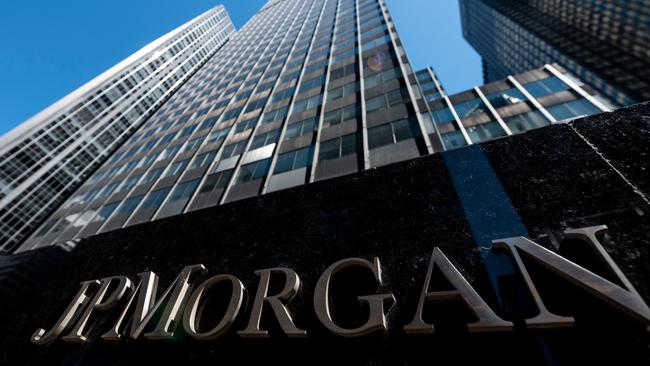
AFP
5.55am: Gold higher on US stimulus talks
Gold futures ended higher, with some progress toward another coronavirus aid package and the further spread of COVID-19 in the US, as well as a breakdown in Brexit talks between the UK and the Eurozone, lifting haven demand for the metal.
February gold rose $US26, or 1.4pc, to settle at $US1,866 an ounce.
Dow Jones
5.50am: Dow edges down as COVID-19 cases rise
The Dow Jones Industrial Average slipped, after hitting a record last week, as investors worried that elevated COVID-19 infection levels could weigh on economic growth through the winter months.
The blue-chip index fell 203 points, or 0.7 per cent, in afternoon trading. The S&P 500 dropped 0.4 per cent, while the technology-heavy Nasdaq Composite ticked up 0.2 per cent.
Stocks have rallied to record highs in recent weeks on brightening economic prospects due to the development of COVID-19 vaccines. But rising coronavirus infection levels and their potential impact on the rebound is weighing on sentiment. New restrictions intended to slow the spread of the virus in California went into effect Sunday night, after the number of people hospitalised in the US because of COVID-19 hit another record.
“For US growth, the vaccine is not going to have a substantial impact on this third wave,” said James McCormick, a strategist at NatWest Markets. “The US growth picture in the very near term is clearly tilting lower.”
Data released Friday showed that US job growth slowed sharply in November, suggesting the labour-market recovery is losing steam amid the surge in coronavirus cases and new business restrictions.
“The V-shaped recovery has kind of flatlined,” said Scott Clemons, chief investment strategist at Brown Brothers Harriman. Still, stock investors have kept the market near record highs due to expectations that the US economy will normalise after distribution of a coronavirus vaccine, he added.
In the near term, the rising case levels and faltering recovery could encourage Congress to pass a new fiscal-stimulus package, some investors said. An expanding, bipartisan group of lawmakers has been trying to settle on a coronavirus-relief agreement to help businesses and families through March. Lawmakers and aides said Sunday that they hoped to have legislative text ready early this week.
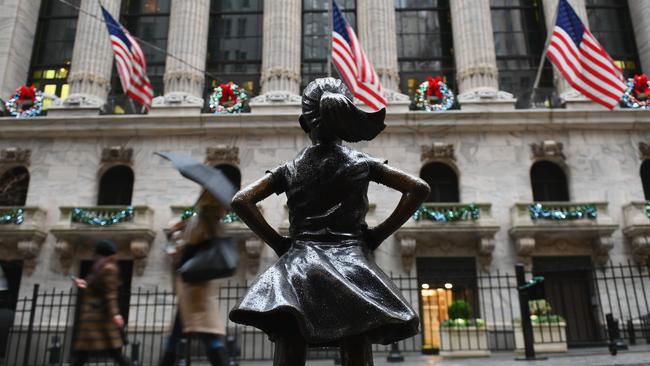
Energy was the worst-performing sector. Exxon Mobil shares dropped 1 per cent after The Wall Street Journal reported that the oil giant faces the threat of a proxy fight from a newcomer activist investor.
Overseas, the pan-continental Stoxx Europe 600 declined 0.3 per cent as trade talks between the European Union and the U.K. entered a crucial stage. The British pound fell 0.7 per cent against the dollar following reports suggesting that Brexit negotiations have broken down.
Hong Kong’s Hang Seng Index closed 1.2 per cent lower following a Reuters report that the U.S. is readying sanctions against Chinese officials over their alleged role in disqualifying certain Hong Kong opposition lawmakers.
Dow Jones Newswires
5.10am: Goldman, Tesla eye office moves
Goldman Sachs is exploring the relocation of its asset management business to Florida, while Tesla Chief Executive Elon Musk is eyeing a move to Texas, according to US media reports.
The potential moves underscore how the upheaval of the coronavirus could challenge regional economic legacies in the United States, where New York has long been the dominant financial centre and California has been the top place for technology.
Florida and Texas also happen to be two of the nine US states that have no state income tax.
Goldman Sachs has reviewed potential offices north of Miami that could service wealthier clients in the city, as well as in Palm Beach and Fort Lauderdale, according to Bloomberg News, while investment fund Elliott Management plans to move its headquarters to Florida from New York.
AFP
5.05am: Brexit fears weigh on pound, equities
The pound slumped around one per cent against the dollar and euro as post-Brexit trade talks between Britain and the European Union hung in the balance.
Major European stock markets dropped except for London, as the sliding pound helped boost share prices of multinationals trading on the benchmark FTSE 100 index.
Around 1630 GMT, the pound was down by 0.7 per cent against the US dollar, recovering part of its losses. Meanwhile the euro jumped by 0.8 per cent versus the British currency.
The FTSE drifted higher, while oil prices retreated by about 0.4 per cent. Frankfurt fell by 0.2 per cent and Paris shed 0.6 per cent. Down by around half-a-per cent, sterling’s losses widened sharply after Britain’s Sun newspaper said Prime Minister Boris Johnson was willing to abandon post-Brexit trade talks with the European Union, falling by more than 1.0 per cent at one point.
Johnson was due to speak with EU Commission chief Ursula von der Leyen later in the day.
While Britain made one concession on Monday, it ruled out extending talks into 2021, and hopes were not high for an imminent breakthrough as time runs out to strike a deal before Britain leaves the EU single market on December 31.
“The British pound declined against all of its major trading partners as investors placed bearish hedging positions and some doubted that a deal would be made by Wednesday’s artificial deadline,” said market analyst Edward Moya at currency trading platform Oanda.
“Sand is running out of the Brexit hourglass as the UK seems to have ruled out extending the Brexit transition period,” Moya added, putting the real deadline for a deal at the end of the week.
The threat of a wrenching “no-deal” comes after Brussels’ chief negotiator Michel Barnier briefed ambassadors from EU member states at a pre-dawn crisis meeting, warning that divisions were still stark after talks with his UK counterpart David Frost broke up overnight.
Market focus was also firmly on COVID-19 vaccine developments as the new trading week got under way.
Traders are keeping tabs on the deployment of vaccines around the world, with Britain in line to start offering jabs this week.
AFP
5.00am: BIS warns on overstretched market valuations
The Bank for International Settlements warned about “overstretched valuations” on financial markets, saying that promising news on vaccines was eclipsing the uncertain economic outlook.
Although markets rebounded in November, concerns about the difference between valuations and the economic outlook persist, said the BIS, the international financial institution that links central banks.
Rapid progress towards COVID-19 vaccines and Joe Biden winning the US presidential election boosted risky assets, which are now approaching, and in some cases surpassing, pre-pandemic levels, the BIS said in its quarterly review.
“While markets have moved in the right direction in response to news about the vaccine, they are above or close to the levels that prevailed before the pandemic, when questions about overstretched valuations were already present,” said Claudio Borio, head of the BIS monetary and economic department.
Renewed optimism about business conditions and the continued assurance of central bank support to mitigate the repercussions of the pandemic’s second wave also fuelled markets’ buoyancy.
With government bond yields still exceptionally low, the search for returns on investments resumed, prompting new investors to put money into the stock markets.
AFP
4.58am: Deutsche to link exec pay to green targets
Germany’s largest lender Deutsche Bank said that its top executive’s pay will partly be based on achieving sustainability targets from next year onwards.
The bank said it had created annual growth targets for business activities linked to sustainable finance and investment projects and “plans to link them to management compensation from 2021”.
The new rules, covering the variable part of pay packets, will initially affect fewer than 20 people, AFP understands, including the ten members of the management board chaired by CEO Christian Sewing and seven senior executives.
The bank plans to extend the practice to other levels of management, AFP has learned.
The bank in May set itself the target of reaching a volume of 200 billion euros ($US243 billion) in sustainable projects by 2025, whether through financing for clients or investments made by its own asset management division.
It put up a goal of 20 billion euros in sustainable projects by the end of this year, and confirmed that it “is confident of comfortably reaching the target”.
AFP
4.55am: Universal Music buys Bob Dylan’s catalogue
Universal Music has bought the entire back catalogue of Bob Dylan’s songs, the company announced, describing the deal as “one of the most important” music publishing agreements of all time.
The deal covers more than 600 song copyrights spanning 60 years including “Blowin’ In The Wind,” “The Times They Are a-Changin’,” “Like A Rolling Stone,” “Lay Lady Lay,” (and) “Forever Young,” Universal Music said in a statement.
The music company gave no financial details of the purchase but the Financial Times reported it was a “nine-figure deal.” The New York Times estimated the price at more than $300 million. The value of owning music rights has soared in recent years with the surge in popularity of streaming sites such as Spotify, a trend that has grown during the pandemic lockdown.
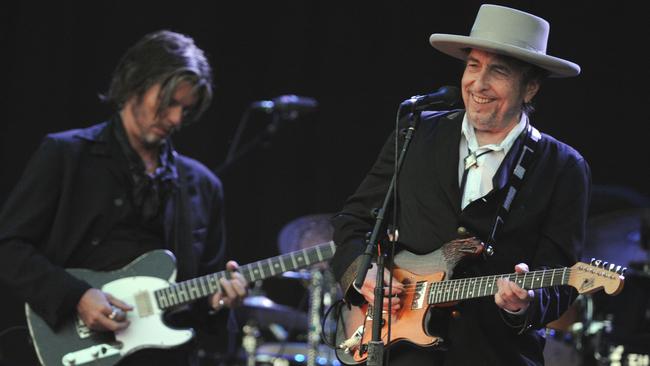
AFP
4.50am: Ikea to scrap famed catalogue
Swedish furniture giant Ikea said it would stop printing its famed physical catalogue, printed yearly in tens of millions of copies, after 70 years, as customers move to digital alternatives.
The catalogues offered a snapshot on contemporary living that made them intensely popular, with circulation reaching a peak in 2016, when 200 million copies in 32 different languages were distributed worldwide.
But as fewer people were reading the printed catalogue as online shopping soared, the retailer said it had taken the “decision to respectfully end the successful career of the Ikea Catalogue”.
AFP
4.42am: Paris Air Show cancelled
Organisers of the Paris Air Show said they have cancelled next year’s edition of the event because of the COVID-19 pandemic.
The biannual show, usually held in June, is the world’s key event for the aerospace industry, showcasing civilian and military aircraft and equipment.
“In light of the uncertainty linked to the COVID-19 health crisis, the Paris Air Show must sadly announce the cancellation of its 2021 edition,” organisers tweeted, calling the decision “inevitable”.
The dates for the next scheduled Paris Air Show in 2023 would be announced shortly, they said.
Europe’s other major air show, at Farnborough in the UK, was this year held online-only as Covid raged.

AFP
4.40am: China exports surge by 21.1pc
China’s exports rose in November at their fastest pace in almost three years, official figures showed, as a surge in demand in key markets ahead of the festive period also helped the country post a record trade surplus.
The reading is the latest spot of good news out of the world’s number two economy, which has been enjoying a bounceback from virus-induced lockdowns that sent it into a rare contraction earlier in the year.
Overseas shipments grew 21.1 per cent on-year last month to $US268 billion thanks to strong demand for medical goods and electronics.
The figure -- the best since February 2018 -- surpassed the 12 per cent tipped in a Bloomberg poll of analysts and was much better than the 11.4 per cent seen in October. The reading also marked the sixth straight month of growth.
AFP



To join the conversation, please log in. Don't have an account? Register
Join the conversation, you are commenting as Logout